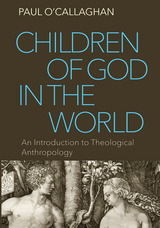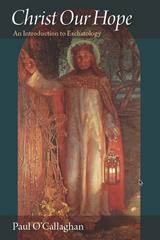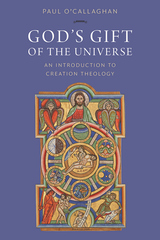3 books about O'Callaghan, Paul

Children of God in the World
Paul O'Callaghan
Catholic University of America Press, 2016
Children of God in the World is a textbook of theological anthropology structured in four parts. The first attempts to clarify the relationship between theology, philosophy and science in their respective approaches to anthropology, and establishes the fundamental principle of the text, stated in Vatican II's Gaudium et spes, n. 22, "Christ manifests man to man." The second part provides a historical overview of the doctrine of grace: in Scripture (especially the teaching of the book of Genesis on humans 'made in the image of God', as well as Paul and John), among the Fathers (in particular the oriental doctrine of 'divinization' and Augustine), during the Middle Ages (especially Thomas Aquinas) and the Reformation period (centered particularly on Luther and the Council of Trent), right up to modern times. The third part of the text, the central one, provides a systematic understanding of Christian grace in terms of the God's life present in human believers by which they become children of God, disciples, friends and brothers of Christ, temples of the Holy Spirit. This section also provides a reflection on the theological virtues (faith, hope and charity), on the relationship between grace and human freedom, on the role of the Church and Christian apostolate in the communication of grace, and on the need humans have for divine grace. After considering the relationship between the natural and the supernatural order, the fourth and last part deals with different philosophical aspects of the human condition, in the light of Christian faith: the union between body and soul, humans as free, historical, social, sexual and working beings. The last chapter concludes with a consideration of the human person, Christianity's greatest and most enduring contribution to human thought.
[more]

Christ Our Hope
An Introduction to Eschatology
Paul O'Callaghan
Catholic University of America Press, 2011
Christ Our Hope is a masterful reflection on Christian eschatology, in a textbook of twelve accessible chapters.
[more]

God's Gift of the Universe
An Introduction to Creation Theology
Paul O'Callaghan
Catholic University of America Press, 2021
There are many ways of understanding the reality of the world we live in and experience. Science, philosophy, art all offer us ample descriptions, explanations and intuitions. But Christian believers go beyond all that, for they attempt to understand the origins of the universe in terms of the creation of the world by God. Revelation tells us what God had in mind when he made the world ex nihilo, without presuppositions of any kind. God’s Gift of the Universe attempts to present the principal elements and stages of creation theology. The doctrine is to be found fundamentally, of course, in Scripture, both Old and New Testament, which describes the world in the light of God’s word. Yet since God actually gave existence to the world, down to the last detail, our reflection on God’s word not only explains the reality of creation, how it works, its nature, as science does. It also explains how creation came into being in the mind and heart of the Triune God, and, ultimately, why God created the world.
In God’s Gift of the Universe, a considerable effort has been spent throughout the book on the Christological and Trinitarian aspects of creation, particularly in the theology of Church Fathers. Creation is presented besides in a deeply eschatological key, for God created the world for purpose of making his glory eternally manifest. The book also considers the way God ‘intervenes’ in the life of the created world, through conservation in being and providence. The meaning of time, matter and spirit are considered. The need for ecological awareness is central. One aspect of the mystery of creation that receives special attention is the presence of evil in the world. This is of particular importance once we accept that God made the world, whole and entire, thus assuming responsibility for the world as it is. The origin of evil through the sin of spiritual creatures provides the ultimate though not the only explanation of the mystery of evil. Particular consideration is given to the reality of ‘original sin’.
[more]
READERS
Browse our collection.
PUBLISHERS
See BiblioVault's publisher services.
STUDENT SERVICES
Files for college accessibility offices.
UChicago Accessibility Resources
home | accessibility | search | about | contact us
BiblioVault ® 2001 - 2024
The University of Chicago Press









